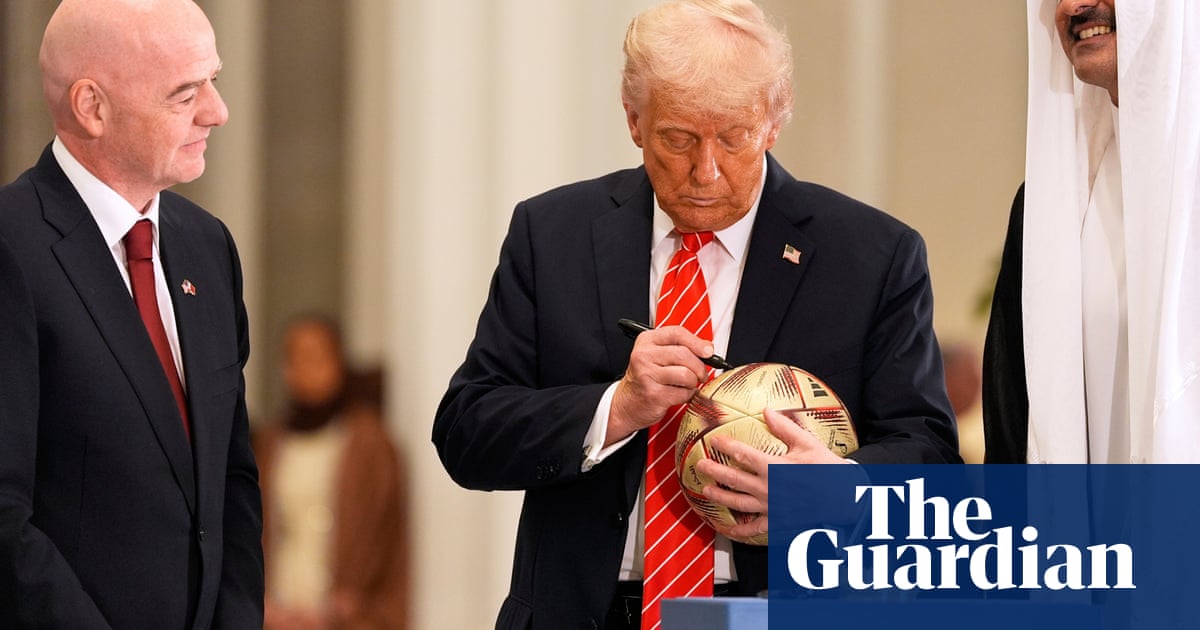Uefa has accused the Fifa president,Gianni Infantino, of pursuing “personal political interests” ahead of his responsibilities to football. The shock intervention from European football’s governing body came after several national delegates walked out on the annual Fifa congress earlier on Thursday.
The delegates, who included the president ofUefa, Alexander Ceferin, and the chair of the Football Association, Debbie Hewitt, did so in protest at alterations to the meeting’s schedule, caused by Infantino arriving late to proceedings after accompanying Donald Trump on a tour of Gulf states.
In unusually strong language, Uefa said the changes to the schedule were “deeply regrettable”. It went on: “TheFifacongress is one of the most important meetings in world football, where all the 211 nations in the world’s game gather to discuss issues that affect the sport right across the world.
“Our hosts, the Paraguay FA and our partners at Conmebol, had gone to considerable effort to accommodate so many delegates and we thank them for their hospitality. But to have the timetable changed at the last minute for what appears to be simply to accommodate private political interests, does the game no service and appears to put its interests second.
“We are all in post to serve football; from the streets to the podium, and Uefa members of the Fifa council felt the need on this occasion to make a point that the game comes first and to leave as originally scheduled.”
Infantino had been in the Middle East with Trump visiting leaders from Qatar, who staged the 2022 World Cup, and Saudi Arabia, the 2034 hosts. During one ceremony, Infantino watched on as Trump signed a golden football given to him by the Emir of Qatar.
Delays to his flight from the Gulf to Asunción, meant Infantino arrived at his organisation’s important annual meeting three hours late. He apologised on stage for his absence several times but also insisted it was important he represented football at the meetings. “As president of Fifa my responsibility is to make decisions in the interests of the organisation,” Infantino said. “I felt that I needed to be there to represent football and all of you.”
In what has the potential to signal a major rupture in the game, Uefa’s statement and its criticism of Infantino has brought to the surface tensions that have simmered for some time. European countries have been frustrated by Fifa’s governance under Infantino, feeling they have little influence over an organisation whose interests seem to lie elsewhere. It is also increasingly seen as a rival competition organiser in the club game, while a split over the approach to human rights at the Qatar World Cup has also festered.
Sign up toFootball Daily
Kick off your evenings with the Guardian's take on the world of football
after newsletter promotion
Until this point it has been left to the lone voice of the Norwegian Football Association president,Lise Klaveness, to speak out. She pursued Fifa over a lack of remedy for migrant workers’ families in Qatar for two years and joined the walkout at the congress on Thursday.
Calling Infantino’s absence “concerning”, she said: “I understand the frustration and disappointment from European Fifa members, and we feel sorry for the excellent hosts in Paraguay. Now we expect Fifa to explain this situation to its members and ensure that the voices of the member associations are heard and respected going forward.”
